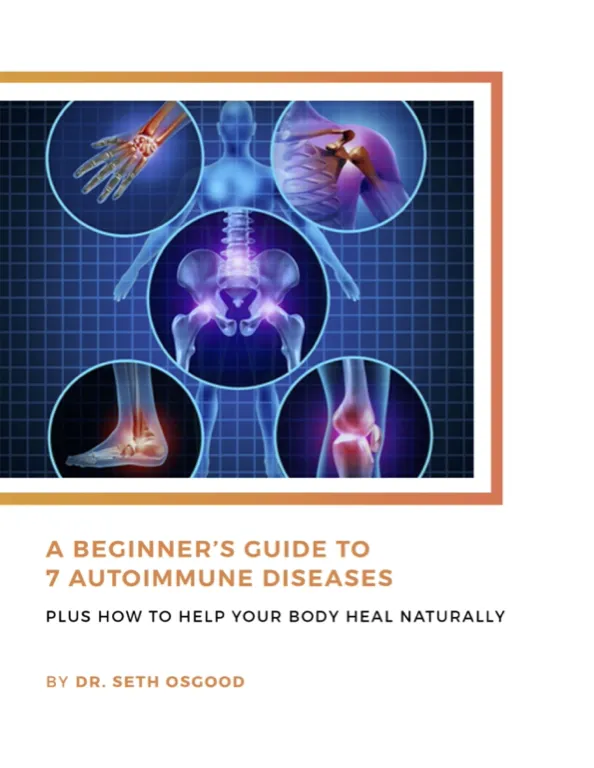Raise your hand if you experience stress on a regular basis. I’m willing to bet you have your hand up right now.
In today’s world virtually everyone is dealing with at least some stress, and unfortunately, many people are dealing with a LOT of stress. However, stress does more than affect your mood. In fact, stress is a root cause of many chronic illnesses, and there is a particularly strong stress-autoimmune connection.
Retrospective studies have found that up to 80% of people with an autoimmune condition experienced a period of high stress before developing their disease. A recent Swedish study that followed 1 million people over a 30 year period found that people with stress-related disorders such as PTSD were 30 to 40% more likely to develop an autoimmune condition. And many of my patients tell me they experience a flare-up in their autoimmune symptoms when dealing with more stress.
So let’s talk about how stress leads to and worsens autoimmunity, and 4 tips to help manage your stress!
Understanding the Stress-Autoimmune Connection
There is actually a very interesting connection between stress and inflammation because not only are they linked, they are also very similar in the sense that when they are acute or short-term they can be very helpful. It’s when they become chronic that they become dangerous.
When you experience any kind of stress your body releases a flood of hormones, including cortisol. Cortisol is handy when you’re dealing with an immediate stressor, like giving a presentation or running a race, because it keeps you energized and focused. But it is also highly inflammatory, which makes sense because our bodies evolved primarily to face physical stressors, like running away from danger or surviving an illness, and our immune systems needed to protect us. Then, once the stressor passes, cortisol suppresses your immune system, bringing your inflammation back down to normal levels.
However, most of us aren’t dealing with an isolated incident of stress here or there. Today we are typically dealing with chronic stress that never really goes away. And if you are chronically stressed then your immune system stays on high alert for long periods of time, keeping you chronically inflamed.
Eventually, your body tries to counteract this by suppressing your immune system to about 40 to 70% below baseline in order to protect you. Yet this paradoxically leaves you vulnerable to infection and illness.
This is why you’re more likely to get sick after a really stressful period like completing a big project at work.
However, when the next stressor comes your immune system goes right back on high alert, ramping up the inflammation again. This inflammatory rollercoaster takes a toll on your immune system, increasing the risk that it will overreact and attack your own body, which is what triggers or worsens an autoimmune disease.
On top of that, when your immune system is suppressed, it’s more likely that latent viral infections will reactivate, including Epstein-Barr, which is the mono virus, and herpes. These viral infections, in particular, have been linked with autoimmune disease, and when they reactivate they can also trigger or worsen autoimmunity.
Plus, stress can damage your gut health, which we know plays a huge role in autoimmunity. When your immune system is in overdrive the inflammation it produces can damage your gut lining, leading to leaky gut, which creates even MORE inflammation
And when your immune system is eventually suppressed, it leaves you open to an overgrowth of yeast or bacteria, known as Candida Overgrowth and Small Intestinal Bacterial Overgrowth, which also cause leaky gut, lead to more inflammation, and worsen autoimmunity.
4 Tips to Relieve Stress and Minimize its Impact on Autoimmune Disease
So if you are someone who is dealing with any autoimmune condition or looking to prevent one, it is essential to learn how to manage and relieve your stress! Because I get it, we’re all going to experience stress, it’s just a fact of life. What we CAN do is find ways to relieve and let go of stress so that your immune system gets a break and your inflammation stays under control. The best part is, you don’t need to be a meditation guru to minimize stress and protect your health.
Here are 4 of my favorite easy ways to relieve stress.
1. Deep Breathing
This one is great because you can do it anywhere, it only takes a minute, and you feel an immediate effect.
Just sit up straight, close your eyes if you like, and take deep breaths in through your nose and out through your mouth. It counters stress by slowing your heart rate and lowering your blood pressure.
You can also try 4-7-8 breathing which is a core part of meditation and yoga practices, and has been used for centuries to clear the mind and relax the body. Check out this video to learn how.
2. Spend Time with Friends and Family
Spending time with your loved ones is a perfect way to be mentally present and recharge. One study found that women in particular benefit from spending time with friends and children because it helps release oxytocin, a natural stress reliever.
So sit down for dinner with your family without the TV on, or even just pick up the phone and call a friend to catch up.
3. Use an Infrared Sauna
Unlike traditional steam saunas, infrared saunas use targeted wavelengths of infrared light that travel deep into your body, warming you from the inside out. These infrared waves regulate your cortisol levels, and the deep penetration of heat eases tension and relaxes muscles. Infrared saunas are also a lot less hot than traditional saunas, making them more relaxing.
At GrassRoots Functional Medicine’s New Hampshire clinic, we offer on-site infrared sauna therapy sessions in our medical-grade Sunlighten sauna, and many natural spas are now offering infrared sauna sessions as well.
4. Add in Stress-Relieving Adaptogens
Adaptogens are herbs that help balance out your body’s stress response and are perfect for anyone dealing with adrenal fatigue, which develops as a result of chronic stress. Essentially your adrenals get burned out from constantly pumping out stress hormones, leaving you less equipped to deal with stress when it arises. Adaptogens help decrease stress hormones when they are high, and increase them when they are low for a more even balance.
I carry a supplement in my clinic and online store called RootFix StressLess that contains a blend of 4 herbs that support optimal stress response and cortisol production.
These 4 strategies will help you not only feel better but also protect your immune system and defend against autoimmunity and flare-ups.
About the Author: Dr. Seth Osgood is a Doctor of Nursing Practice, Board Certified Family Nurse Practitioner and Institute of Functional Medicine (IFM) Certified Practitioner. Dr. Osgood received his post-graduate training in Functional Medicine through the IFM and from working with Dr. Amy Myers. He has helped people from around the world improve their health utilizing a Functional Medicine approach.
Want to work with Dr. Osgood and the GrassRoots team? Become a patient in our West Lebanon, New Hampshire Functional Medicine clinic, our Burlington, Vermont Functional Medicine clinic, or our Austin, Texas Functional Medicine clinic!






0 Comments